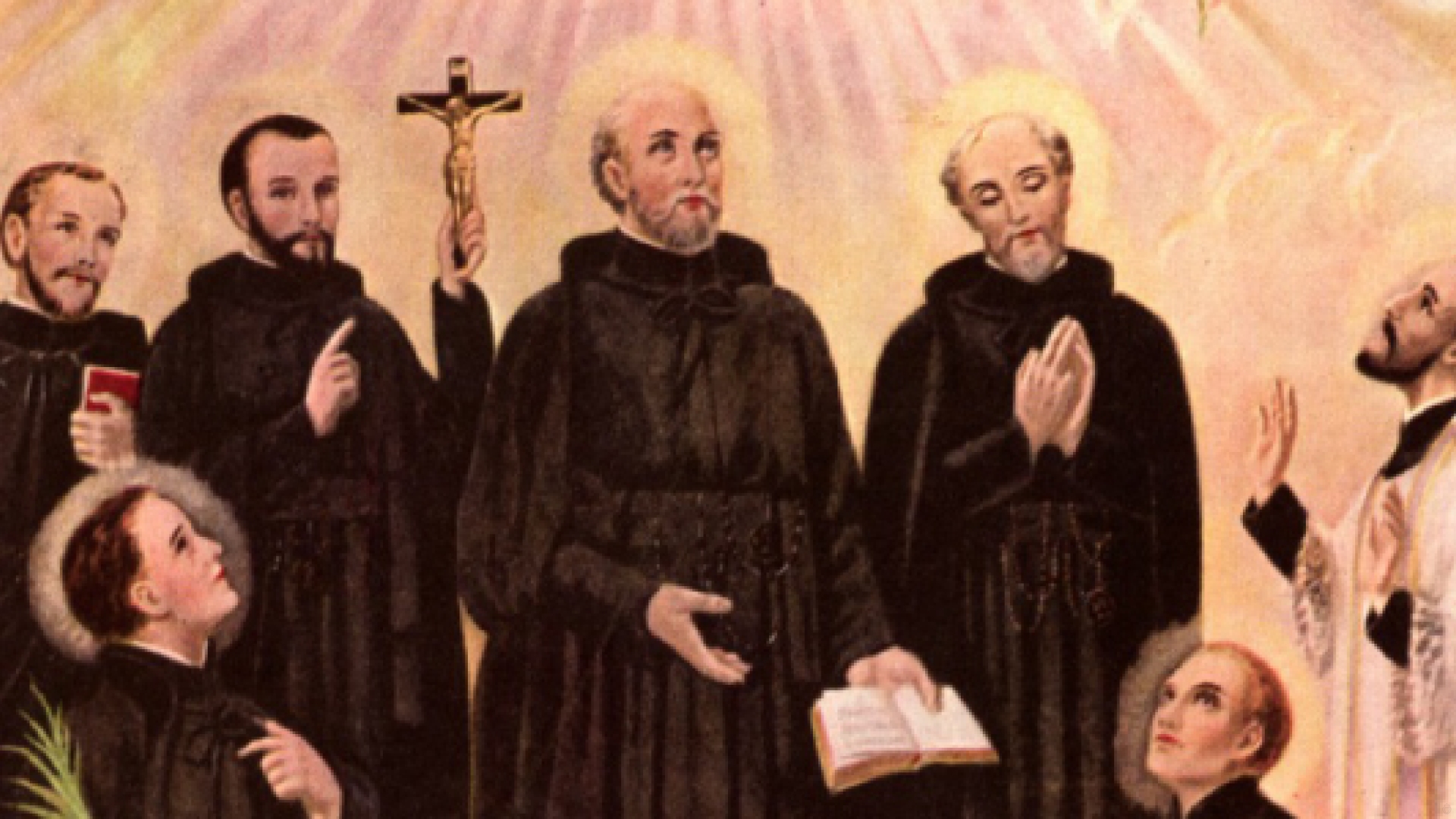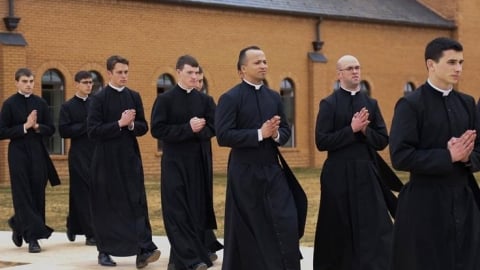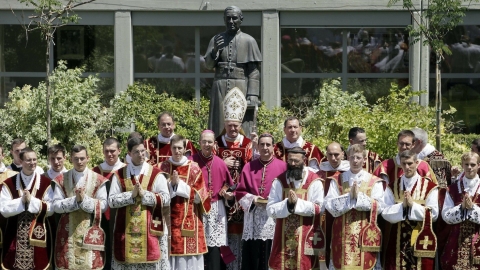Fr. Jean Brébeuf on Missionary Vocations I

Οn July 16, 1636, Father Jean de Brébeuf wrote a lengthy report to his religious superior. Father Paul Le Jeune, on the state of his mission among the Huron savages, to the east of what is now Lake Huron. The document contains some fascinating chapters, illustrating what might be called the romance of the missions. In chapter three, however, by way of interlude, the heroic missionary decides to give a timely word of advice to those in France, presumably his younger religious brethren, who are ardently longing to go on the foreign missions of New France. He does not "pull his punches" when he tells of the hardships, trials, and sufferings of missionary life, but neither does he omit the compensations and consolations of that apostolate. In these lines Brébeuf seems to be giving us the proper technique in dealing with a vocation to the missions. It is this; don't overemphasize the romance, but tell the truth, the whole truth, the bitter along with the sweet, of the call to the foreign missions.
BRÉBEUF'S ADVICE TO PROSPECTIVE MISSIONARIES
We have learned that the salvation of so many innocent souls, washed and made white in the Blood of the Son of God is stirring very deeply the hearts of many, and is exciting in them new desires to leave Old France in order to come
to the New. God be forever blessed, who thus shows us that He has finally opened to these tribes the bowels of His infinite mercy. I do not wish to chill the ardor of this generous resolve. Alas! it is these very hearts according to God's own Heart whom we are expecting. I wish only to give them a word of advice.
It is true that "love is strong as death" (Canticles 8:6). The love of God has power to do what death does, that is, to detach us entirely from creatures and from ourselves. Nevertheless, these desires that we feel of working for the salvation of infidels are not always sure signs of that pure love. Sometimes there may be present a little self-love and self-seeking, if we look only at the blessing and satisfaction there is in putting souls in heaven, without duly considering the sufferings, labors, and difficulties, inseparable from these evangelical works.
Difficult Journey
Wherefore, that no one may be deceived on this point, "I will show him how much he must suffer here for the name of Jesus" (cf. Acts 9:16). True, the two who came last, Fathers Mercier and Pijart, did not have as much hardship on their journey as we who came up the year before. They did not paddle; their men were not sick, as ours were; they did not have to carry heavy loads. Still, no matter how easy the trip with the savages may be, there is always enough to greatly discourage a heart not well mortified. The readiness of the savages does not shorten the road, nor smooth over the rocks, nor remove dangers. No matter with whom you may be, you must expect to be at the very least three or four weeks on the way, to have as companions persons you have never seen before, and to be cramped rather uncomfortably in a bark canoe, with no freedom to turn this way or that, in peril fifty times a day of being upset or dashed upon the rocks. During the day the sun scorches you; at night you are likely to be a prey to mosquitoes. You sometimes ascend five or six rapids a day, and in the evening you have for refreshment only a little corn crushed between two stones and cooked with very clear water. Your bed is the ground and often rough, uneven rocks. There is no shelter but the stars. And with all this--perpetual silence. If you are accidentally hurt, or if you fall sick, do not expect any help from these barbarians; for whence could they get it? And if the sickness is dangerous and you are far from the villages, which are very scattered, I should not guarantee that they would not abandon you, if you could not follow them unassisted.
When you reach the Hurons you will indeed find hearts full of charity. We will receive you with open arms as an angel from paradise; we will have all the good will in the world to do you good, but we are almost powerless to do it. We will receive you in a hut so miserable that I do not think there is in France any by comparison so wretched that I might say: "That is how you will be lodged." Harassed and tired as you will be, we can give you only a poor mat, or at most a skin for your bed. And besides, you will arrive at a season when miserable little insects, which we call taouhac here, but "fleas" in straight French, will keep you for almost entire nights from closing your eyes, for in these parts they are incomparably more bothersome than in France. The dust of the cabin breeds them; the savages bring them to us; we get them in their dwellings. And this petty martyrdom, not to speak of mosquitoes, sandflies, and other like vermin, continues usually through the three or four summer months.
Instead of being the great professor and learned theologian you were in France, you must reckon on being here a humble little school-boy, and, good God! with what teachers!-women, small children, and all the savages and exposed to their laughter! The Huron language will be your Saint Thomas and your Aristotle; and clever man that you are, and glib speaker among learned and talented persons, you must make up your mind to be for a long time mute among these barbarians. You will have achieved much if, after a considerable time, you begin to stammer a little.
Trials and Dangers of Mission Life And then, how do you think you are going to spend the winter here? Having heard of all that is endured in wintering among the Montagnets savages, I can say that it is almost the life we lead here among the Hurons. I say it without exaggeration: the five or six months of winter are spent amid almost continual discomforts extreme cold, smoke, and the importunity of the savages. We have a cabin built of simple bark, but so well jointed that we have to go outside to learn what the weather is. The smoke is very often so thick, so acrid, and so persistent that, for five or six days at a time, if you are not entirely used to it, about all you can do is to make out a few lines in your breviary. Besides, from morning until night, our fireplace is almost always beset with savages certainly, they seldom fail to be there at mealtimes. If you happen to have anything more than usual, no matter how little it may be, you must reckon on most of these gentlemen as your guests; if you do not share it with them, you will be considered mean. As regards the food, it is not so bad, though we usually content ourselves with a little corn, a piece of dried smoked fish, and some fruits, about which I shall speak further on.
Up to now we have considered only the roses. As we have Christians in almost all the villages, we must count on making the rounds of them at all seasons of the year and of remaining there, according to necessity, for two or three whole weeks, amid indescribable hardships. Add to all this, our lives depend upon a single thread. If, wherever we are in the world, we are to expect death every hour and to be always prepared for it, this is particularly the case here. For, not to mention that your cabin is like straw and, despite all your care to prevent accidents, may catch fire at any moment, the malice of the savages gives you cause for constant fear on this point. A malcontent may burn you down or split your head open in some lonely spot. Then, too, you are responsible with your life for the sterility or fecundity of the earth. You are the cause of droughts. If you cannot make it rain, they talk of nothing less than doing away with you.
Moreover, I need only mention the danger there is from our enemies. Suffice it to say that, on the thirteenth of this last month of June, they killed twelve of our Hurons near the village of Contarrea, only a day's journey from us. A short time before, at four leagues from our village, some Iroquois were discovered in the fields in ambush, only waiting to strike a death-blow at some passer-by. This nation is very timid; they take no precautions; they are not careful to prepare arms or to enclose their villages with palisades. Their usual recourse, especially when the enemy is strong, is flight. Amid these alarms, which affect the whole country, I leave you to imagine if we have any grounds for security.
However, if we had here the exterior attractions of piety, as in France, all this might still be put up with. In France the large number and the good example of Christians, the solemnity of the feasts, and the majesty of the churches so exquisitely adorned, all preach piety to you. And in our houses, the fervor of our brethren, their modesty, and the noble virtues that shine forth in all their actions these are so many powerful voices which ceaselessly cry out to you: "Look, and do thou also in like manner" (cf. Luke 10:37). You have the consolation of saying Holy Mass every day. In a word, you are almost beyond the danger of falling at least the falls are insignificant and you have help immediately at hand.
Here we have nothing, it seems, which invites to good; we are among peoples who are astonished when you speak to them of God and who often have only horrible blasphemies in their mouths. Frequently you will be compelled to deprive yourself of the Holy Sacrifice of the Mass: and, when you have the chance to say Mass, a little corner in your cabin will be your chapel, and even if you had the means, the smoke, the snow, and the rain would hinder you from decorating and embellishing it. I pass over the little opportunity for privacy there is among barbarians, who almost never leave you alone and who hardly know what it is to speak quietly. Above all, I do not dare to speak of the danger there is of ruining oneself among their impurities, in the case of any one whose heart is not sufficiently full of God to firmly repel this poison. But enough of this; the rest can be known only by experience.
"But is that all?" someone will say. "Do you think that by your arguments you have thrown water on the fire which consumes me, and have lessened ever so little the zeal I have for the conversion of these nations? I say that these things have served only to confirm me the more in my vocation. I feel more affection than ever for New France. I bear a holy jealousy towards those who are already 'enduring all these sufferings. All these labors seem to me nothing, in comparison with what I should like to endure for God. If I knew a place under heaven where one could suffer yet more, I would go there."





